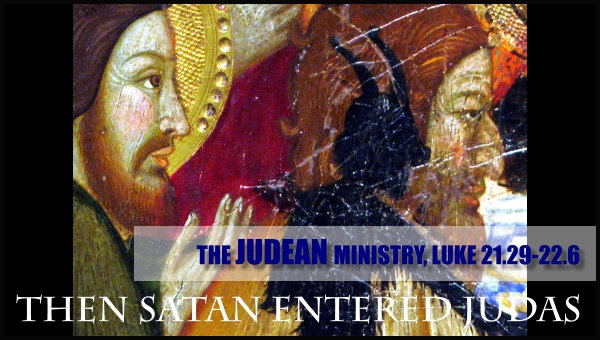By Tyson Thorne

The Judean Ministry at Various Cities (18.1-24.53), 21.29-22.6
Last week Jesus told us to watch for the signs of his second coming. We begin this week with the parable of the Fig tree, which underscores this point. Just as one can tell the change in seasons be looking at the leaves of trees, so one should be able to identify the season of Christ’s return. For those who see the signs will be the generation that witness his return. You can count on it, for Jesus has spoken it and his words will never pass away. For this reason, we ought to spend each day in anticipation of his return.
Unfortunately, all too many spend their days in pursuing the pleasures of this world rather than the mercies of Christ. One wouldn’t want to be caught on the day of His return in laziness or drunkenness or even being overly concerned with the problems of this world. Rather we should be found in prayer so we may stand firm in all the days leading to that great moment.
Luke now inserts a biographer’s note, that while Jesus was teaching in the temple each day at night he retreated to the Mount of Olives for restoration and sleep. Since Jesus had been talking about signs, Luke gives one of his own. The time of year was that of the Passover Feast, a sign that the time of Jesus’ crucifixion is near. To put a fine point on it, we are told that the religious authorities were plotting to execute the Messiah. For those familiar with the Gospel story, the next verse (22.3) tells us immediately that we are near the stories end.
“Then Satan entered Judas, the one called Iscariot, who was one of the twelve.”
This single verse packs a lot of information into a very few words. Judas is famously known for his betrayal, and many have wondered what prompted it. Was it greed only? 30 pieces of silver was a lot of money, but was it so much that he would join the plot against the Messiah? Some have suggested that Judas knew Jesus was the Messiah and understood Jesus’ teaching that he was not bringing in the kingdom now. Judas made his bargain with the religious leaders to force the Messiah’s hand and bring in the kingdom. But this verse tells us that this is to generous a statement.
We are told that Satan “entered” Judas. This isn’t something that happens suddenly; permission must have granted by Judas for this to have taken place. It is unlikely that Judas would have agreed to such a thing in the spur of the moment. He was undoubtedly involved in some form of witchcraft or occult practices previously. It may have been before he met Jesus and something he went back to later, or may have been something he became involved with after joining the disciples. This part of Judas’ life is untold and we are left to surmise the event’s leading up to this point.
While possessed by Satan he went to make his bargain with the chief priests. He involved himself in their plans and took his bounty. We are told that this “delighted” the religious authorities, which tells us a lot about their spiritual life. From this point onward Judas looked for an opportunity to betray the Lord. And while Satan may have been “in” Judas, it was Judas who was responsible for this betrayal. We need to understand that even though a person may be possessed they are still responsible for their actions and decisions. This isn’t like the possessions of lesser spirits like the one that threw a boy to the ground or caused violent behavior as in the demoniac of the Gadarenes. This would have involved some ceremony, some meeting between Satan and Judas and a deal struck.
|
|